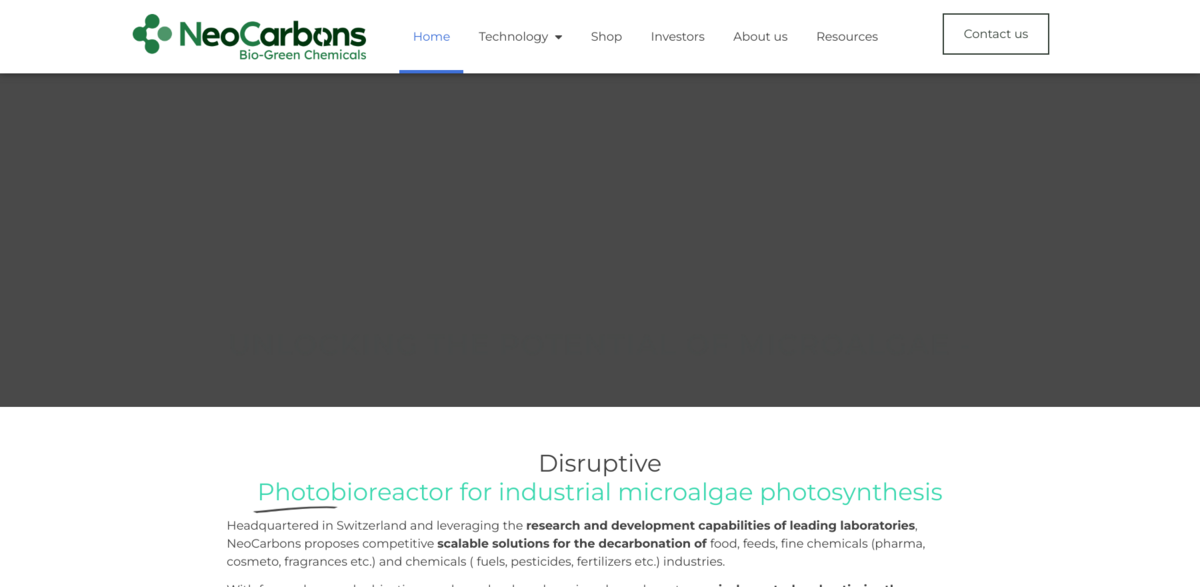What is NeoCarbons’ Project All About?
NeoCarbons is unlocking the potential of microalgae with a breakthrough photobioreactor technology designed to recycle CO2 into valuable biochemicals. Headquartered in Switzerland and backed by top-tier research labs, this patented equipment offers a disruptive solution for industrial microalgae photosynthesis. It targets decarbonation across food, feeds, fine chemicals (like pharma, cosmetics, fragrances), and chemicals industries (including fuels, pesticides, fertilizers). The core idea? Turning CO2—yes, that greenhouse gas—into a raw material for the 21st century, fueling a sustainable bio and green chemicals revolution.
Main Benefits of NeoCarbons’ Photobioreactor Technology
The technology packs a punch with impressive productivity and consistent quality, making it a game-changer for clients. Here’s what stands out:
- Energy transfer inside the photobioreactor drives daily productivity, quality, and production costs—this is NeoCarbons’ proprietary know-how.
- Achieves over 10x g/l concentration, tested on major microalgae strains including cyanobacteria.
- Significantly boosts production of high value-added biochemicals such as proteins, pigments, fine chemicals, and precursors.
- CPU-controlled process ensures industrially compatible, high-throughput continuous operations.
- Compatible with chemical and thermal sterilization processes, ensuring hygiene and safety.
How NeoCarbons Stands Out in the Market
Unlike many existing technologies that struggle with productivity and competitiveness, NeoCarbons’ equipment is designed to be high-yield and cost-effective. It’s built to compete head-to-head with fossil-based value chains and imports, especially from Asia. Plus, it delivers constant quality unaffected by weather or location—pretty crucial for industrial-scale operations. Initially, the focus is on European microalgae manufacturers, where demand is booming but local supply can’t keep up. This serves as a solid industrial proof of concept.
Scaling Up for Industrial Impact
By 2027, NeoCarbons plans to validate and license an industrial capacity of 11m³. This scale is aimed at industries emitting significant CO2, offering them a real-time, industrial solution to decarbonate their processes and products. The timing couldn’t be better—this equipment is set to support the Sustainable Aviation Fuel (SAF) market, aligning perfectly with the 2030 aviation decarbonization goals. It’s a smart move for industries ready to move beyond “wait and see.”
Certifications and Recognitions
NeoCarbons’ innovation isn’t just talk—it’s backed by solid credentials:
- US & EU Patents securing the technology’s uniqueness.
- Collaboration with ZHAW on industrial microalgae processes.
- Winner of the Swiss Innovation Challenge.
- Supported by the Swiss Climate Foundation.
Project Impact on Sustainable Development Goals (SDGs)
- SDG 7: Affordable and Clean Energy – by enabling sustainable biofuels production.
- SDG 9: Industry, Innovation, and Infrastructure – through cutting-edge photobioreactor technology.
- SDG 12: Responsible Consumption and Production – by recycling CO2 into valuable products.
- SDG 13: Climate Action – directly reducing industrial carbon footprints.
- SDG 15: Life on Land – minimizing environmental impact through sustainable practices.
Why This Matters for the Future
NeoCarbons is more than just a tech company—it’s a pioneer in turning CO2 from a problem into a resource. The equipment’s ability to produce alternative proteins and green chemicals with a net negative CO2 balance means industries can finally align profitability with sustainability. As the world races toward 2030 decarbonation targets, solutions like this aren’t just nice to have—they’re essential. For anyone invested in climate and food transitions, this breakthrough offers a real, scalable path forward. It’s about making green chemistry not just possible, but competitive and profitable.


















